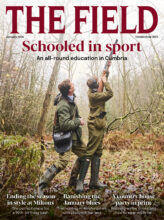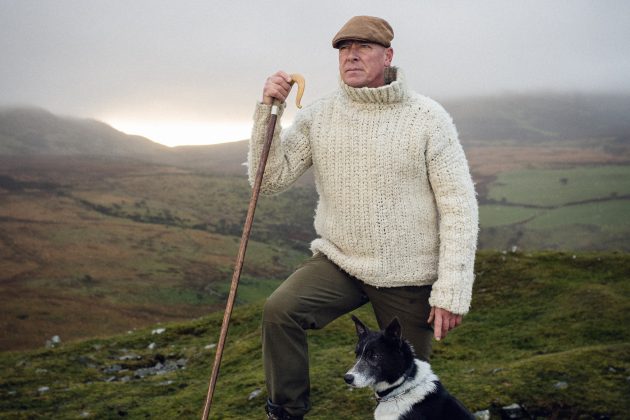The Welsh hill farmer and television star on his sporting childhood, his rise to fame and his fight for the future of British food at a time when fewer people than ever understand where it comes from
Racing up the foothills of the Carneddau mountains, trying to beat the next rain pulse, my opening question for Gareth Wyn Jones is blown away by a breath – no, a howling gale – of fresh air. That’s what it is like meeting Gareth and two of his dogs, Max and Jack, and some of his 4,000 sheep out on the hill.
All the complex global, environmental topics that world leaders have to travel to holiday resorts to discuss are answered with fierce directness up here as we shelter among Celtic cairns high above the Menai Strait. Gareth Wyn Jones has been called “television’s favourite farmer” for his strong social media presence and his many appearances on both S4C and the BBC, including Countryfile and The Family Farm.
The bones of the place
Now he is explaining his own farm to The Field. He reveals the bones of the place: “Six thousand years ago, this was an axe factory and all round here you will see the remnants of Celtic burial mounds and cairns. Down there are ancient field systems where my sheep are grazing. My family has worked this land for 375 years. I had a crazy childhood, shooting and hunting and fishing. There was no social media and we would just go off into the mountains, fishing in the lake or shooting rabbits and stray pheasants, or head out sea fishing.”
When S4C made a documentary about Snowdonia National Park, Jones was called in to tell the story of sheep farming in the largest contiguous area of ground over 2,500ft in Wales and England. He says: “I found I really enjoyed doing it. Then I took part in another S4C programme called the Fferm Ffactor, where 10 of us competed head to head in a series of farming challenges – I came fourth and it was the best experience.”
Television’s favourite farmer
At this stage it couldn’t be called a media career, but then came the devastating late snowstorm of spring 2013. Jones had to try to rescue the family’s beloved rare-breed Carneddau ponies as well as sheep, and found himself broadcasting direct from the disaster. In his autobiography, The Hill Farmer, he writes: “A couple of weeks after the snow had gone we buried 76 ponies… It was a harrowing experience.”
A decade later Jones still carries the scar tissue, but he is positive. “It was then that I realised how powerful the media is; there was such a huge response. And I thought, this is a way you can tell your story and get your ideas out there.”
The story of food
Jones knew the story he wanted to tell: about how the food we eat comes not from factories or supermarkets but from farming, shooting and fishing. He says: “When you have worked the land as long as my family has, you know that every piece of food, whether meat or vegetable, comes at a cost. We need to be more open and discuss this – for example, in relation to shooting and pest control. We need to have a balance, and I am not afraid to speak about that. I recently did a video on the subject for the GWCT. It’s not being controversial, it is being honest about something people are scared to confront.”
Jones has noticed that sensible predator control is helping bring red grouse back to Snowdonia, and he wishes that the RSPB would be more open about the impact of over-predation on ground-nesting birds, and about the role of game shooting in helping bird populations.
We need to build a better Britain on our bellies
He says: “My friends and I have a little shooting syndicate, and I always notice all the songbirds about when I am standing on the peg waiting for the drive to begin. Those wouldn’t be there in numbers if it wasn’t for the shoot management. And, of course, we eat everything we shoot. Which would you rather – a bird that has been out in the wild all its life or one that has been factory- farmed? We have to share that story one person at a time.”
He is concerned about the nation’s dependency on supermarkets full of imported and highly processed foods. It’s a supply chain highly vulnerable to problems such as COVID-19 and the Ukraine war. Jones comments: “I have been warning for some time now that we are sleepwalking into food shortages. Food has been artificially too cheap and now we have a big fight to stand up against the big factories and retailers. Of course, not everybody wants to eat meat, and that’s a matter of personal choice, but let’s have the conversation. I want people to get truthful information about what they are eating.”
Whether it is a sheep grazing a Celtic hill fort or a stag overlooking a Highland glen or just a hen laying an egg, for Jones these are all part of a whole value system built on our food and how we get it. His battle cry is: “We need to build a better Britain on our bellies.”
Big food retailers have a stranglehold
He describes an experience during the milk price slump of 2015 when he helped a local family get their cattle to market. “They couldn’t go on dairy farming, so they were selling the last cows. I will never forget closing the ramp of the lorry and looking over at the farmer’s young son, and the look on his face… he was heartbroken. And that was just caused by the greed of supermarkets using milk as a loss leader. We are in this situation again now, where the big retailers not only have a stranglehold over the producers but are also brainwashing the public about what is or isn’t good food.
“I am fighting the fight because I believe so much in it. When you see the disconnect between people and their environment, and you think I could be the last generation to do this, you just have to fight.” Which brings me to the question I wanted to ask up there on the mountain. How do you keep on going, when everybody seems to think that food comes on a motor scooter? He replies in Welsh: “Lle i enaid gael llonydd. I live in a place for the soul to find peace.” So the mountain answered the question after all.
To learn more about Gareth, subscribe to his YouTube channel.





